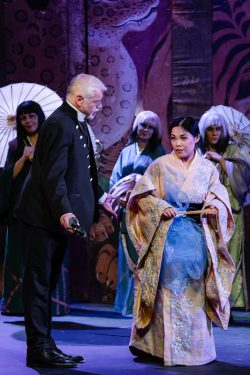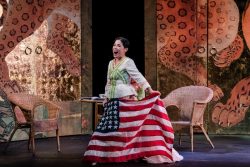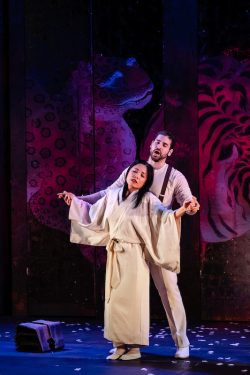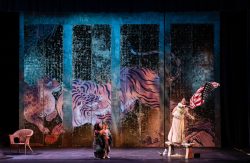 DORSET Opera is celebrating its 50th birthday in style, with two spectacular productions on the stage of the Coade Hall at Bryanston, 20 miles but light years away from its first opera staged at Sherborne School in 1974.
DORSET Opera is celebrating its 50th birthday in style, with two spectacular productions on the stage of the Coade Hall at Bryanston, 20 miles but light years away from its first opera staged at Sherborne School in 1974.
 The big story of this anniversary year is the commission of a new opera based on a beloved work by Dorset writer Thomas Hardy, but the second show, incredibly the first DO production of Madama Butterfly, is no make-weight. The company has often led the way in its choice of repertoire, introducing forgotten works to an enthusiastic local audience, but this year it is the popular sounds of Puccini that fill the auditorium in a splendid
The big story of this anniversary year is the commission of a new opera based on a beloved work by Dorset writer Thomas Hardy, but the second show, incredibly the first DO production of Madama Butterfly, is no make-weight. The company has often led the way in its choice of repertoire, introducing forgotten works to an enthusiastic local audience, but this year it is the popular sounds of Puccini that fill the auditorium in a splendid
retelling of the familiar story.
One of Dorset Opera’s USPs has always been its chorus, made up of local singers, music students and professionals who work with a chorus master for weeks before the performance, creating a large scale chorus that only the leading international companies can now afford. For the 2024 productions, under the direction of Stephen Harris, the DO chorus has never sounded, looked or acted better. This Madama Butterfly, sung in the original Italian with surtitles, is sensitively and incisively directed by Jamie Hayes and conducted by Jose Miguel Esandi, played on a magnificent gilded set designed by Rufus Martin and painted by Binny Mathews. Graduating students from Arts University Bournemouth have worked with the company on the costumes, and the whole has created an authentic Japanese atmosphere in which to play out this dreadful tale of American imperialism and Japanese honour codes and male domination.
 There isn’t a more selfish, self-pitying and arrogant “hero” in the whole of opera than Lt Pinkerton, and Jose Simerilla Romero has the commanding presence and powerful voice to make him wholly convincing. David Kempster’s intelligence and subtlety explains the plight of the hapless consul Sharpless, unable to stop the young officer from taking his pleasure without care for the fragile child he wants for a short-term bride.
There isn’t a more selfish, self-pitying and arrogant “hero” in the whole of opera than Lt Pinkerton, and Jose Simerilla Romero has the commanding presence and powerful voice to make him wholly convincing. David Kempster’s intelligence and subtlety explains the plight of the hapless consul Sharpless, unable to stop the young officer from taking his pleasure without care for the fragile child he wants for a short-term bride.
For three of the four performances at the Coade Hall, Eri Nakamura is Cio Cio San, but for the matinee I saw it was the turn of Romanian soprano Letitia Vitelaru, a student of Mirella Freni, to bring this tragic heroine to the stage, and magnificently she did it. Her soaring soprano made light work of orchestra and chorus, but she never lost the poignant dedication to her ruthless husband.
 Lucia Cervoni was the loyal servant Suzuki, with Aled Hall making the most of the comic potential of matchmaker Goro and Arthur Bruce making much more impact than is usually made by the suitor, Yamadori. Young Hattie Grainger made a real impact as the confused and devoted child of the brief marriage.
Lucia Cervoni was the loyal servant Suzuki, with Aled Hall making the most of the comic potential of matchmaker Goro and Arthur Bruce making much more impact than is usually made by the suitor, Yamadori. Young Hattie Grainger made a real impact as the confused and devoted child of the brief marriage.
This spectacular production has lasting vocal, musical and visual impact – another fine example of the extraordinary standards achieved in a few short weeks by Dorset’s own opera company, 50 years on from Patrick Shelley’s first courageous steps and now in the capable hands of Rod Kennedy.
GP-W
Photographs by Julian Guidera